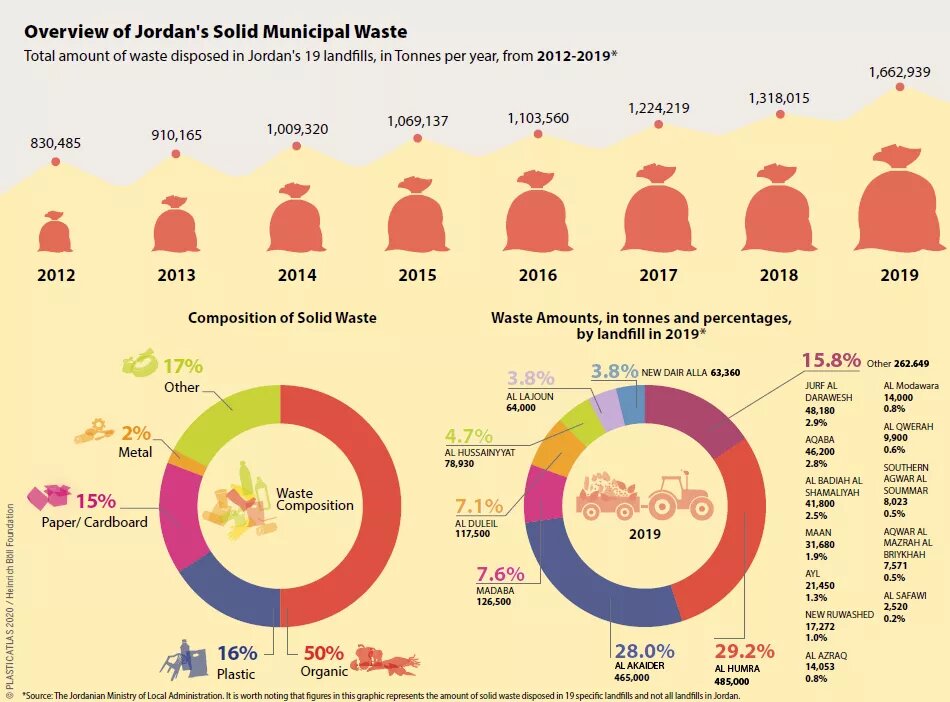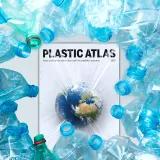In light of the absence of governmental plans and programs for waste management in Jordan, sorting and recycling processes for plastic waste are limited to individual initiatives by activists and environmental organizations. The amount of solid waste reaching 19 landfills in Jordan has increased to about 1.662 million tons annually, despite the existence of legislations that regulate this process.

Jordanians do not pay much attention, as they dispose of plastic waste in random ways, to the “catastrophic” effects of their behavior on the environment; an act that may be fatal to animals and marine organisms and even leads to the destruction of nature. Plastic and solid municipal waste, be it from domestic, industrial, or medical sources, finds its way to containers disbursed in residential neighborhoods in various regions of the Kingdom, often without sorting and later without recycling, only to be left to its fate in nature until it is buried in landfills. With the expansion of cities and urban areas in different parts of Jordan, municipal solid waste increases by the day. According to estimates by the Ministry of Local Administration, the volume of waste received at the 19 landfills scattered in various regions of the Kingdom was approximately 1,662,939 tons in 2019 (figure does not include the solid waste arriving to all landfills in Jordan). Organic waste constitutes approximately 50 percent of the total waste volume, while the plastic recyclables constitute 16 percent, paper waste 15 percent, and metal waste is 2 percent, all according to the second State of the Environment Report for 2016.
Trivial as it may seem, the situation is alarming given the high rates of population growth, which reached 2.2 percent as a result of forced migrations to Jordan that occurred in the recent period, as well as the increase in industrial activities. All of this leads to enormous volumes of different kinds of waste from agricultural, municipal, construction, and industrial sources, as well as from ports. The health crisis that swept Jordan and the rest of the world since the end of 2019 only exacerbates the challenges that the waste management sector is witnessing in the Kingdom. Statistics by the waste treatment department at the Greater Amman Municipality (GAM) indicate that incoming waste to the east Amman transformational station has reached 29,855 tons, due to the response to this pandemic, in the period between 17 March and 10 May 2020.
Despite the negative impact of plastic waste on natural resources such as soil and water, the official statistics issued by various authorities in Jordan fall short from mentioning the annual quantities, let alone detailing them. The study prepared by the Royal Marine Conservation Society of Jordan (JREDS) remains the only study that specifies the extent of this problem, but it is limited to Aqaba Governorate only. The study deals with the garbage collected on beaches and from the sea during clean-up campaigns and indicates that approximately 7 tons of solid waste were collected in the 2015 campaigns, over 65 percent of which was plastic waste. In 2016, 3 tons of waste were collected. The outcome of the 2017 campaign came out with a bit more than 450 kilograms of waste. This significant decline in the weight of collected waste came as a result of the increased number of campaigns organized periodically by JREDS reaching about 20 campaigns per year in addition to the diversification of targeted collection sites in each campaign. JREDS is not alone in this mission, as it partners with Aqaba Special Economic Zone Authority (ASEZA) through projects implemented for that purpose, along with partnerships with local organizations.
The reason for the lack of statistics on this type of waste in the Kingdom could be attributed to the fact that official interest is limited to plastic shopping bags. In 2017, the Ministry of Environment had issued a regulation regarding “biodegradable plastic shopping bags”. However, the enforcement of the regulation, which bans the production, import, and circulation of black plastic bags except for those used for waste collection and agricultural seedlings, came almost two and a half years late. In December 2019, in coordination with the industrial and trade sectors, the Minister of Environment, Dr. Saleh Al-Kharabsheh, issued a ban on black plastic bags that could be implemented immediately. This came as a surprise to many in the plastic production sector. Although they support the Ministry’s move to protect both public health and the environment, their concern stems from the fact that converting their production lines to manufacture these types of biodegradable bags needs time. However, some citizens expressed their fear that merchants would take advantage of this decision by imposing additional, possibly high, prices on plastic shopping bags, especially if they were made from paper. These concerns did not impede a number of inspection campaigns by the Ministry of Environment on establishments that produce, trade, or import shopping bags. According to statistics by Jordan Food and Drug Administration (JFDA), more than 30 million plastic bags are thrown every year in Jordan, an average of 584 bags per person. These bags are manufactured by more than 400 factories, of which 200 are properly licensed.
Despite the various legislations enacted by several government agencies to address solid waste, primarily plastic, be it through its sorting or recycling in order to mitigate its environmental and health impacts, the problem persists. This is due to limiting the efforts of governmental and private entities in Jordan to managing municipal solid waste only. At the top of these bodies is the Ministry of Environment, which is responsible of planning and developing policies and legislative frameworks, while also monitoring the environmental performance of each of the practices and methods used in the disposal phase. The responsibility for this mission is shared with the Ministry of Local Administration through the 100 municipalities affiliated with it and that are spread out through the Kingdom’s different governorates, in addition to the 21 joint services councils. The responsibility for waste management in the capital, Amman, is part of the tasks assigned to GAM. ASEZA is responsible for these matters within the boundaries of Aqaba Governorate.
Realizing the importance of waste management in light of pressures resulting from the increasing quantities of waste, the Ministry of Local Administration launched the National Strategy for Solid Waste Management in 2015, which the government adopted as a developmental plan until 2024. The Strategy aims to upgrade and advance solid waste management systems as well as to improve fiscal management and technical operations towards optimizing the use of the available resources by reducing costs and improving the quality of services provided by the municipalities. In order to ensure full implementation of the Strategy, the Ministry of Environment developed a short-term implementation plan based on policies and indicators as well as topics, all identified through the development of practical steps and measurement tools especially designed for it.
Experts and specialists believe that the regulatory and legislative measures adopted by the Ministries of Local Administration and Environment are insufficient, as they fall short from addressing the issues of sorting and recycling on the one hand, and alleviating the environmental and health problems caused by plastic and other waste on the other. However, everyone is awaiting the implementation of the waste management law that the parliament approved at the beginning of 2020. For the first time, the provisions of this law allow to form higher steering committee for waste management to be headed by the Minister of Environment.
When heading south, namely to the Aqaba Governorate, the situation is completely different. ASEZA, which issued in 2001 the Regulation for the Protection of the Environment in the Aqaba Special Economic Zone, is responsible for taking measures related to waste collection as well as for preparing regulations for the construction of stations and landfills. This Regulation reveals to tourists and citizens who set foot in the city the keen interest in the cleanliness of neighborhoods and streets. In 2015, the Prime Minister’s approval of a regulation for waste collection and general hygiene in Aqaba Governorate supported the ASEZA’s efforts to manage waste, at a time when a regulation on plastic bags was already being enacted.
Apart from legislations and laws enacted by the government and the authority, sorting and recycling projects are also on the agenda of some of the official bodies, but in general, they do not target plastic waste. GAM is implementing the project “Climate and Resource Protection through Circular Economy (separated collection at source)”, funded by the German government and in cooperation with the Deutsche Gesellschaft für Internationale Zusammenarbeit (GIZ), in three neighborhoods in the capital, Amman. The project aims to improve the solid waste management system by encouraging separated collection of waste at source. Among the governmental initiatives to develop the solid waste management sector in Jordan, it is worth mentioning the cooperation with international bodies to improve the infrastructure through implementing several projects, including the establishment of 11 stations for sorting purposes, recycling, and the production of organic fertilizer.
Nonetheless, plastic waste recycling remains limited to individual efforts by civil society organizations, some citizens, and environmental activists. According to a report published by the Environment and Development Magazine in May 2020 on the Jordanian experience in the field of solid waste management, theoretically, had Jordan recycled its plastic waste, it would have been able to recover 187,000 tons annually from this material. The untapped energy in solid waste is estimated at 4 percent of Jordan’s oil consumption, bearing in mind that Jordan collects more than 95 percent of its waste, while the Arab world collects on average no more than 50 percent of its waste, according to the same report.
Among the successful individual youth initiatives in the field of separated collection and recycling in Jordan, a team of engineers launched a mobile phone application in early February 2020. The app aims at collecting plastic, paper, and cardboard waste, for recycling. This application, which is called “Green Go” and is the first of its kind in Jordan, includes a set of guidelines and steps to be followed by the individuals, companies, institutions, and others to set a permanent account though which a waste collection vehicle can be requested. The service currently reaches three governorates, namely Mafraq, Amman, and Zarqa. Irbid will be added at a later stage.
Such individual initiatives and those implemented by a number of civil society organizations in Jordan intersect with governmental strategies, regulations, and instructions issued to manage the solid waste sector. However, they focus more on waste separated at source as well as recycling of plastic and paper waste, among other materials. At the same time, such initiatives demonstrate serious intention among citizens, especially the youth, to find creative technical and technological solutions to deal with the problem of plastic waste in the Kingdom in order to preserve the environment. This is how Jordanians join the ranks of many in their generations around the world, who are launching campaigns and initiatives to protect their livelihoods and planet.
This is a chapter from the Plastic Atlas 2020.
